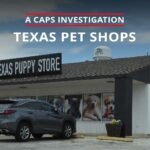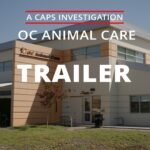Shake A Paw Lynbrook
1 Atlantic Avenue
Lynbrook, NY 11563
(516) 825-7877
Date and time of CAPS investigation: 10/29/20; 2:45 pm
Approximate number of puppies observed at time of investigation: 50
Shake A Paw Lynbrook has two rooms with very high ceilings. As you walk in, the sales counter is on your right. Sometimes there are rabbits in glass enclosures in this room, which you can see just before you enter the puppy room. The second room had open enclosures with around 50 puppies. The enclosures, which took up the entire room, had solid walls of clear plastic and floorings covered with shredded paper. Puppies’ enclosures did not display cards with breeder and broker information, which is not required under Nassau County law if this information is on microchips. A sign offering source information was posted near the stall where customers interact with puppies individually. It read: “Information on the source of these dogs and cats, and veterinary treatments received by these dogs and cats, is available for review by prospective purchasers.”
I spoke to an employee named Dylan, (Caucasian male, about 30 years old, 5’8”, approximately 200 lbs., with glasses, short brown hair, and COVID mask covering his nose and mouth) who showed us a 4 month-old female English Bulldog puppy (sale price $5,699).
When Investigator 2 asked where the puppy was from, the employee replied “Salem, Iowa.” Investigator 2 then asked, “How are these guys raised? On some big farm or house?” The employee replied, “Generally if it’s a hobby breeder, generally it’s their house. That’s like me or you breeding a dog. We can’t have more than three adult dogs on the premises. Versus a commercial breeder essentially would usually have a bigger area.”
Later in the investigation, I said, “We are concerned; we don’t want to get a dog from a puppy mill. We want it from a reliable breeder. So that’s why I’m curious … like what can you tell us about her breeder, where she came from?” The employee replied, “Her breeder was … it just says a name so that’s generally a hobby breeder. If it’s a commercial breeder it will generally say ‘this and this kennel,’ you know, stuff like that. So, it’s a hobby breeder, meaning there’s no more than three dogs on premises and it’s monitored by the USDA.” I then asked, “Wait wait wait, what? I’m sorry … no more than three dogs?” The employee replied, “Three adult dogs on premises. So, like say I have three dogs at home. Say I decided to become a breeder and I bred my dogs. I would have to get USDA certification to do it, be monitored by the USDA.”
Later in the investigation, referring to the puppy’s breeder, the employee said, “You probably won’t be able to find them online. That’s the other big thing. These guys, these breeders, are generally commercial breeders – they sell to stores and stuff like that. They don’t want to deal with the general public.” When I asked for clarification, “But this one isn’t [a commercial breeder], you said … they only have three dogs,” the employee replied, “Well it’s a hobby breeder; they’re still selling to stores, so that means they don’t want to deal with the public.”
When I expressed concern about the fact that the puppy came from Iowa, the employee replied, “Iowa … I mean, we have pictures of where our puppies come [pointing to poster on the wall with generic images of commercial dog kennels that reads “This is where our puppies come from”]. Like, the owner literally goes to these places and takes pictures of where the puppies are and everything. He’s not going to buy from somewhere if he doesn’t like the look of it. I don’t deal with the breeders personally; it’s the owner of the store who goes out and does all that. He does the research for you, so you don’t have to.” Later in the investigation, I again asked “So like he’s been to her property?” The employee replied, “Yeah. He won’t use any breeder he hasn’t met personally.”
When I asked what made Shake A Paw so confident in the breeder of the Bulldog puppy, the employee stated, “The USDA is constantly monitoring; the AKC, the ASPCA all monitor the breeders we use. The other big thing that, with this dog at least, is being the fact that it is registered by the AKC, which means the AKC is also involved in the monitoring process of making sure the dogs are healthy. The AKC is the most well-known organization in the world for purebreds, so they take pride in their dogs.” The employee also stated “The USDA is actually the people that monitor the puppies and all that fun stuff.” Later on in the conversation, the employee also stated, “The USDA is definitely the best thing to look at. Those are the people that check the dogs. They’ve been there. They’re literally there every month.” I asked, “And they like check, even though she [referring to the puppy’s breeder] only has three dogs? They’ll be there checking her?” The employee replied, “They have to.”
Despite repeated requests for paperwork on the puppy’s breeder, the employee did not show me any, saying that the store provided this at the time of purchase. I asked, “Well, I mean, just the breeder’s name? I could go research it.” The employee replied “I can see if I can pull it up but usually I can’t, you know. It’ll print out with the paperwork. When we print out paperwork, that’s when they give it to you.” Later on, I asked “So what paperwork, when we buy this dog, is going to come with her?” The employee replied, “Anything we have and can give you, we will give you. Once the puppy is yours, we have no use for the paperwork. So, everything we have, we will give to you.” I said “That is what scares me. I am a lawyer and I like paperwork. I would like to see the paperwork before paying the $5,000 or 6,000.” The employee replied “Well, before you spend, sign anything, read it. You know I want you to read it. All that fun stuff. We’ll go through everything and if you have questions, you can ask.” I stated “Yeah, cause that sign says ‘Information on the source of is available by prospective purchasers. I’m prospective ….. I’m a lawyer. I need paperwork.”
Ultimately, after multiple trips to the back office, the employee did give us the name of the breeder. He said “I called the owner so I can find out who the breeder was for you guys. The name is Lindsey Forquer, and apparently, she specializes in Bulldog breeding. That’s what she does.” Later he said “Apparently, she specializes in Bulldog breeding and all that fun stuff.” He’s known her for a while. He’s dealt with her for a while. He said ten years he’s been with her and she’s been through three different sets of breeding bulldogs.” Later on, I again asked, “Her breeder is indeed, specializes in Bulldogs?” The employee replied “That’s what it looks like, yes.”
When I asked what he meant by “three different sets of breeding bulldogs”, the employee replied “Puppies are only able to be bred for a couple years. They can only have two or three litters max. Shortly thereafter, I asked, “Is that the same with all breeds? Like do all these breeders only breed a few times?” The employee replied, “Most breeders yes. Some only breed once, some only breed two times.”
When I asked if I could find USDA inspection reports for Lindsey Forquer online, the employee pulled up a breeder website (www.usdabreeder.com) on his mobile phone that listed her as a USDA breeder. When he showed it to me, I noticed that her name had the name “Cammie’s Kennels” associated with it. Because the employee had previously asserted that the puppy came from a hobby breeder since it did not have a kennel name, I pointed this out and asked for clarification. “Cammie’s Kennel? What is that?” The employee replied “She probably worked there for a while. That’s probably what she calls herself.” The employee backtracked soon after by stating “Even if she has more [dogs], because she could have more …. If she does own a kennel, that’s a separate entity …. If she has her dogs as a hobby breeder, like say she has bulldogs at home, that’s what she breeds. Then that’s her dogs. But she could also own a kennel and do something else on the side as well.”
Breeder information pertinent to this investigation:
Lindsey Forquer (1494 110th Street, Cammie’s Country Canines, Salem, IA, 52649, USDA #42-A-1544
Brian (Kruse) Lichirie (2329 Hwy 16, West Point, IA 52656, USDA # 42-B-0317)
Evidence of false statements and misrepresentations of breeders by store:
The employee’s statement that Lindsey Forquer is a hobby breeder with only three dogs on premises is false. A search of the USDA website for the most recent inspection reports of Lindsey Forquer’s breeding facility (USDA Inspection Report – Lindsey Forquer 12-5-2019) shows that on December 5, 2019, she had 71 adult dogs and 50 puppies, for a total of 121 dogs on premises. The USDA inspection report for January 4, 2018 (USDA Inspection Report – Lindsey Forquer 1-4-2018) shows a total of 156 dogs on premises. Thus, the employee’s statements that the puppy’s breeder was a hobby breeder “with no more than three dogs on premises” was false.
The employee’s statements that hobby breeders with three dogs had to be certified and monitored by the USDA is false. Per the USDA Animal and Plant Health Inspection Service’s Guidelines for Licensing and Registration Under the Animal Welfare Act (USDA APHIS Guidelines – p. 11-12), small scale breeders or “Hobby Dealers” are exempt from licensing requirements if they fewer than four breeding females.
Additionally, the employee’s statements that the USDA is “constantly monitoring” and inspects breeding facilities “literally every month” are also false. The USDA typically inspects breeders’ facilities once per year. The four most recent annual inspection reports for Lindsey Forquer are dated 12/5/19, 11/27/18, 1/04/18, 1/12/17, and 8/4/16, which proves that the USDA only inspected her facility five times in the past four years.
The employee’s statements that the owner of Shake A Paw “won’t use any breeder he hasn’t met personally” and that he “literally goes to all these places” are false. CAPS has examined hundreds of Certificate of Veterinary Inspections for both Shake A Paw stores, which have the same owner, in Nassau County over the last seven years. They indicate that the stores obtain dogs from many breeders and from brokers who source from multiple breeders. Some of these breeders sell through PBT Marketplace, a online brokering site where pet shops and breeders have accounts. Thus, the employee’s statement that the owner of the store meets all the breeders who provide puppies to the store is false, as it would be highly unlikely if not impossible for the owner to go to so many facilities.
CAPS’ research found CVIs showing that breeder/broker Brian Lichirie (USDA 42-B-0317) provides puppies to the store: CVI – Brian Lichirie (1) and CVI – Brian Lichirie (2). Brian Lichirie has a USDA “B” (broker) license, which means that he could be providing dogs to Shake A Paw Lynbrook that he has brokered from other puppy breeders and/or he is selling puppies he bred himself. Licherie had 465 puppies and 90 adult breeding dogs during his 12/1/20 USDA inspection.
The employee’s following assurances about the owner of Shake A Paw are all false and misleading: “[He] literally goes to these places;” “He’s not going to buy from somewhere if he doesn’t like the look of it,” “[He] goes out and does all that [deals with the breeders personally], and “ [He] does the research for you, so you don’t have to.” As proven above, Shake A Paw gets puppies from broker Brian (Kruse) Lichirie. Lichirie is related to Steve Kruse of Stonehenge Kennel – one of the most egregious commercial dog breeders and brokers in the country.
The USDA temporarily suspended Stonehenge Kennel’s license in Janury 2016 (https://caps-web.org/the-kruse-saga). Following are examples of past USDA Inspection Reports for Steve Kruse’s kennel, which in 2014 was documented as having 1,431 dogs on site: USDA Inspection Report for Steve Kruse (12-16-15) and USDA Inspection Report for Steve Kruse (9-19-16). Lichirie is listed (https://www.beenverified.com/property/ia/west-point/highway-16-residences/) as living at the same address as Steve Kruse (2345 Hwy 16, West Point, IA 52656). Furthermore, Lichirie’s address as shown on the CVIs (2329 Hwy 16, West Point, IA 52656), is the same as breeder/broker Michele Kruse (Steve Kruse’s former wife) aka Gealea Nichols of T & M Enterprises (USDA #42-B-0294). This address is, per Google Maps (https://www.google.com/maps/Kruse Lichirie properties), a vacant property located immediately adjacent to Steve Kruse’s Stonehenge Kennel. It strains credulity that the owner of Shake A Paw Lynbrook, if indeed he visited Lichirie’s breeding operation at the above address, would not consider it a puppy mill given the sheer number of dogs noted on USDA inspection reports for Stonehenge Kennels and the serious infractions incurred by same in past years.
The employee’s statements that the “AKC monitors the breeders” and “the AKC is also involved in the monitoring process of making sure the dogs are healthy” are false. The AKC has no oversight/management role with regards to the breeders’ facilities, nor in making sure the dogs are healthy at same. The employee’s statement that the ASPCA monitors the breeders is also misleading, though it should be noted that the employee later corrected and clarified what he meant by this.
The employee’s multiple statements that Lindsey Forquer specializes in breeding English Bulldogs are also false. CAPS’ research turned up Certificates of Veterinary Inspection from the New York Department of Agriculture and Markets website which prove that she also breeds French Bulldogs and Pugs: CVI – Lindsey Forquer (1); CVI – Lindsey Forquer (2); and CVI – Lindsey Forquer (3). Additionally, on online search shows that Lindsey Forquer also breeds Golden Retrievers: https://www.furrylicious.com/our-breeders.
The employee’s repeated statements that dogs are “only able to be bred for a couple years,” “can only have two or three litters max,” and “some breed only once, some only breed two times” are false and misleading. There is no federal, state or local laws mandating how many times a breeding dog can be bred by breeders in a breeding operation.
The employee’s failure to show me any paperwork containing the breeder’s name and information violated the state lemon law, New York GBS Article 35-D, §753–B 2 & 4. Yet, the store had a sign, required under this law, offering source information to prospective buyers.
Additional comments/conclusion:
As shown in this report, the employee was repeatedly evasive about the nature of Lindsay Forquer’s breeding operation (i.e. whether it was a hobby breeder or commercial breeder), offering false, contradictory and often confusing information throughout the course of the investigation.
The posting of breeder and broker information is not required in Nassau County under Title 79 §5(e) if the animals have a required microchip with this information (consumers can request that the microchip be scanned and the source information provided, but how many prospective buyerw would know any of this?). CAPS has investigated the two Shake A Paw stores in Nassau County. It has always been difficult to convince Shake A Paw store employees to release the name of the breeders and brokers who supply puppies to their store, although New York GBS Article 35-D §753-B 2 & 4 requires that they do so. Even an assistant manager stated during one investigation that breeder information was only available after purchase of a puppy. For these reasons, it nearly impossible for the average consumer to do his/her due diligence before purchasing a dog at a Nassau County pet shop.
Furthermore, even when the consumer goes online in search of USDA information on individual breeders, so many pet shop and commercial breeder advocacy websites have been created in the past couple of years that it is extremely difficult to access impartial information.
The store did not have a sign – to be posted underneath the state disclosure sign – as required under Nassau County Title 79 §4 e, stating that USDA inspection reports are available upon request and that prospective customers can request to see the most recent inspection reports.
Finally, though the USDA website is now again posting inspection reports for the breeders and brokers whom they oversee, the reports are extremely limited in terms of useful information on the conditions at the individual facilities. It is easier than ever for USDA licensees to not get cited for violations because of programs like “teachable moments,” and USDA no longer considering eye, ear and dental issues to be veterinary care violations.



